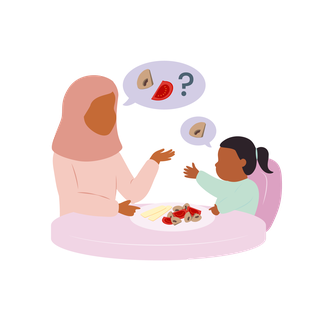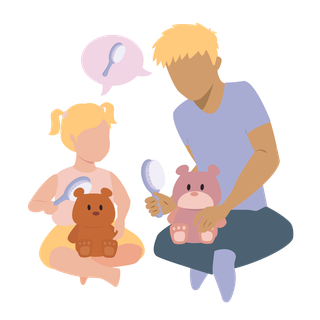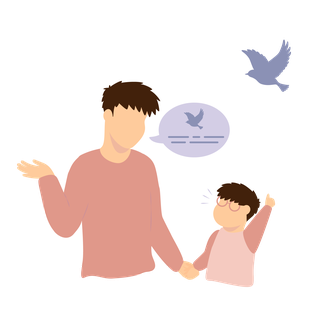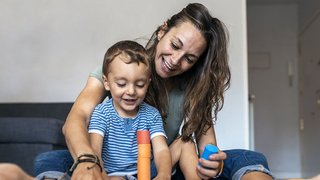Chatting and building sentences: 2 to 3 years
Your child's imagination is a great way to help them build confidence. Activities like pretend play, counting games, or getting them to help out around the home are fun ways to spark their creativity and add to the words they already know.
Try following your child's lead when playing- and talk about what they're doing and what they're playing with. It's a great way to boost their language skills!
Video: Follow your child's interests when playing
Watch a mum role-playing with her child, using toys and creating characters. She follows her daughter's lead to encourage her to express her thoughts and ideas.
Activities for your daily routine

Mealtimes
Mealtimes are a great chance for your child to learn new words. You can help by chatting about the food they’re eating.
When you offer them food, try giving them a choice. For example, hold up a carrot and some cheese and ask, "Do you want carrot or cheese?". If they point or look at one, you can say the word as you give it to them: "Cheese! You want cheese".
Learning new words
Use different types of words to keep things interesting. For example:
- naming words (nouns) like "plate", "cup", or "banana"
- action words (verbs) like 'bite the toast", "drink the water", or "scoop the yoghurt"
- describing words (adjectives) like "cold milk", "sweet apple" or "the crunchy carrot"
Show them how to talk
Children learn language by hearing how words and sentences are used.
The best thing you can do is keep the conversation going.
No need to correct them, just talk naturally. They’ll pick it up and start using words on their own without even realising they’re learning!

Playtime fun
Pretend play is a wonderful way to help your child feel more confident and practise new skills.
You can start with simple games using a teddy or soft toy. Pretend to dress teddy and talk about what you're doing as you go. For example, say things like:
- "Let's dress teddy"
- "Here's a top for teddy"
- "Arm in!"
Let your child take the lead and chat with them about what they're doing. Talking about their actions helps them learn how to put their thoughts into words.
What's teddy's name?
Make it fun by helping your child pick a name for their teddy. Ask them for ideas, and when they decide, use the name often. For example, "Shall we brush Rosie's hair?".
Celebrate their creativity
Encouragement goes a long way! Praising your child builds their confidence and makes them excited to try more. You could say something like, "You came up with such fun ideas for Teddy’s tea party!".

Out and about
Chatting with your child while you're out and about is a great way to help them learn new words.
Pay attention to what catches their eye or what they're curious about. For example, if they notice a bird and say, "Bird," you can add some extra words to this and say, "Yes! a little bird is flying!" or "The bird is singing". This helps them hear new words and learn how they fit together in sentences.
It’s all about turning little moments into fun ways to learn!
Video: Talk with your child about everyday tasks
Watch a child and her parents prepare and eat fruit. Mum and dad ask questions about how to prepare fruit and what fruit she likes best. She also helps tidy up after!
Tiny Happy People
The BBC’s Tiny Happy People website offers simple, expert-backed ideas and activities to support your child’s language and communication skills from pregnancy through their early years.
The tips are easy to add to your daily routine, quick, inspiring, and proven to help your child thrive.

Little tips for everyday play
Libraries are a free way to access age appropriate books. Some also run story time sessions for parents and their children. Find your local library service on gov.uk.
Your local council may offer activities too. Find learning activities for your child on gov.uk.
Family Hubs
Family Hubs offer support to children, young people and their families. They provide a single place to go for support and information from a variety of organisations, making it easier to get the support you need.
They can provide guidance on issues such as feeding your baby or toddler, mental health and parenting support.
Family Hubs are currently operating in 75 local authorities across England.
Learning more than 1 language
It's important to chat with your child in the language or languages you speak at home. For tips on how to do this, check out the National Literacy Trust website.
Help and advice
You and your child will see a health visitor at about 2 to 2-and-a-half years to talk about your child's development. If your child goes to nursery, they will also have a progress review with their key worker.
If your child needs a little extra support, your health visitor and nursery can help. They may also put you in touch with a speech and language therapy team, or signpost you to local activities.
Ask your health visitor for support whenever you need it, they will be able to provide tips and advice.
Remember, children learn to talk at different ages. If you are worried, speak to your health visitor or nursery key worker, or contact your local speech and language therapy service for advice.
For more ideas on how you can help your child, visit:

Early learning and development
90% of your child's brain growth takes place before they turn 5. Discover more advice and activities for ages 0 to 5 to help you make the most of every moment.
